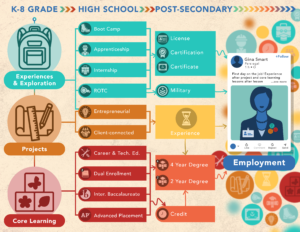Why I’m Opting IN To Testing My Kids

It feels hypocritical. Because the current testing regime makes me angry. Angry for students who are stressed by hours and hours of high stakes testing. Angry for teachers whose value has been discounted as anything other than test-prep machines. Angry for anyone who suffers the misguided consequences of using test results in ways that they were never intended – to prevent graduation and to fire capable teachers. Angry.
But the baby is far too precious to send the way of the bath water. I would be up in arms protesting and boycotting testing if it weren’t for one unassailable truth: state testing is how we know if our students are being educated to the same levels as those in other demographic and socio-economic groups. No Child Left Behind, amid all the horrific and counterproductive side effects, accomplished this one thing too important to ever give up: it shone a light on the disparity between the outcomes for kids of privilege versus kids of poverty and between white kids and kids of color.
As a mom, I cannot, will not, be a part of extinguishing this light.
For almost a decade, I have been advocating for using technology to make school more human. I see technology as a way to shift power from institutions to teachers, families, and students of any age. I see technology as a way to free ourselves from overly prescriptive curriculum and allow students to learn the basics through deep exploration of subjects they find compelling. I see technology as a way to give students the space to learn what they are ready for when they are ready for it rather than being bored or discouraged by a lecture-based pedagogy that moves on relentlessly when the teacher is ready regardless of when the student is. I see technology as a way for students to create and do and use the tools of professionals in the ways professionals use them and to learn deeply from those experiences rather than learn superficially how to pass tests that measure only the narrowest of competencies.
I have welcomed Race to the Top and the focus on using data to give students and teachers insight into and ownership of their work. I have welcomed the push for a national technical infrastructure that gives every child, regardless of zip code, access to the tools and communities of learning that diminish the power of institutions and circumstances over their lives. I have welcomed the Common Core as a first step towards standards that are fewer and deeper and more focused on real understanding than on superficial recollection of facts and procedures. I have embraced the big state testing initiatives as they begin the journey towards developing tests that are richer, more meaningful, less intrusive, and more precise in what they measure.
However.
At the heart of the national and state initiatives to empower children with technology lies a poison pill. I had hoped to see this poison neutralized by states consciously mitigating its effect even while simplistically legislating test scores, by districts creating teacher and leader evaluation programs that provided balance and valued all the contributions that educators make to our children and their learning environment, by principals and teachers in effect practicing a civil disobedience in refusing to dehumanize and impoverish their classrooms. But that hasn’t been the trend.
Instead there has been a frightening buy-in to the belief that these new and immature state tests, these blunt instruments that have such limited applicability, can be used as the ultimate measure of student learning. As a result, much of the amazing accomplishments of students are disregarded. Much of what teachers do to inspire and engage students is ignored. Nothing is measured but success at these tests and so, over time, any richness in our childrens’ classroom is eroded by the encroachment of more and more drill in preparation for these specific and narrow tests. Teaching becomes increasingly narrow and scripted and starts to look like work that could be done by a computer. Classrooms become mechanical and dreary and drive out students who might otherwise graduate and teachers who might otherwise inspire.
As a parent I want to protest and boycott and be heard that this so-called accountability movement (read scapegoating movement) is killing our schools and our childrens’ joy in learning. I imagine all of us refusing to participate and giving them nothing to measure, taking away their weapons against teachers and kids. But, for the sake of all of the kids, not just mine, I can’t.
We must never again allow the poverty-based disparities in education to be unmeasured and ignored.
Instead, I advocate. As parents, I think we must all advocate – not just for our own kids, but for everyone’s. I want a parents’ bill of rights. Something that talks about all our kids deserving more from an education than can be measured by a test, something that talks about all our kids going to a school where teachers are free to be excellent in more than one dimension, something that talks about the goals and values of students and parents mattering just as much as the narrow legislated goals of mechanistic accountability.
But while I advocate, I also opt in.
For more from Marie, check out:






Michelle
Well said! None of this is all or nothing, I think the current protest is necessary so we begin to swing the pendulum back to the middle. We aren't in a fantastic place, but we can't ignore all we've learned and walk away. Gotta keep trying, talking, working, and learning from the mistakes.
Mike DiTullio
This is the most bizarro defense of testing I have every seen. Here's the logic. We know that standardized tests reveal the ever growing gap among the haves and have-nots, so let's keep giving them. Where the technology angle factors into this, I'm not sure. But this I do know: using technology to "personalize" education so that kids can learn at their own rate and level cannot exist in a world where standardized tesst are used with the breadth and depth they currently are. And to use that data to A) measure schools and B) measure teachers makes it worse. Much worse. The only way to send a message that testing is overused and punitive to some schools and teachers is to have kids not show up on testing day. Most of the "boots on the ground" are keenly aware of this.
Marie Bjerede
@Mike, yes that is precisely the logic. But we do need to stop using standardized tests with the "breadth and depth we currently are". And to use this test data to A) measure schools and B) measure teachers doesn't just make it worse, it is akin to malpractice in my mind. I hope that opting out isn't the only way to send that message, but you could be right. If you are, how do we keep our eye on equity?
Marie Bjerede
@Michelle - thanks. Yes, this is an iterative process and the pendulum has swung way too far.